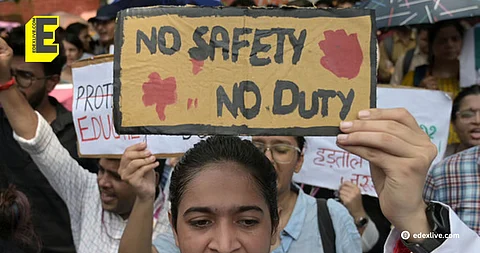

In broad daylight on June 9, a second-year DNB resident in gynaecology at Dr Baba Saheb Ambedkar Hospital (BSA), Rohini, was violently attacked by relatives of a patient following the death of a newborn. The young doctor was reportedly beaten, strangled with her own stethoscope, and had her clothes torn, right inside a hospital corridor, while staff and security personnel allegedly stood by without intervening.
The assault, captured on CCTV, has since triggered national outrage. Yet, access to the footage has reportedly been restricted by the authorities, raising eyebrows and amplifying suspicions of an attempted cover-up.
Medical associations across India have condemned the incident, describing it as a tipping point in the ongoing crisis of violence against healthcare workers.
“This happened in broad daylight. Doctors are being attacked openly. Where is the National Task Force for hospital security?” questioned Dr Datta, a vocal resident doctor, on X. “Hospitals are running like nothing happened,” he added, calling out what he described as “institutional apathy.”
Shockwaves continue to ripple through the medical community. Despite the public nature of the assault, the hospital’s security personnel failed to act. A paediatric resident who attempted to protect her colleague was also injured in the scuffle.
In a scathing post directed at Delhi Chief Minister Rekha Gupta, Dr Dhruv Chauhan, National Spokesperson for the Indian Medical Association’s Junior Doctors Network (IMA JDN), wrote: “Respected @gupta_rekha ji, if this doesn’t boil your blood, and strong action is not taken, then I don't know what will?”
According to officials, the accused were four to five female attendants related to a patient named Soniya from Bakkarwala. They intercepted the resident doctor at around 2 pm while she was en route to Ward.
An FIR was registered at North Rohini Police Station, and the women were arrested under multiple sections of the Bharatiya Nyaya Sanhita as well as the Medical Services and Medicare Act. However, they were later released on bail.
The assaulted doctor later recounted being verbally abused, physically attacked, having her hair pulled, and clothes torn. She sustained bruises and was left in shock. Medical staff rushed to her aid, not security personnel.
In its official statement dated June 10, the Resident Doctors Association of BSA Hospital expressed “deep anguish and grief” over the incident. They condemned the “complete negligence and incapability” of the hospital’s security staff, who allegedly failed to intervene even as the resident was being strangled in front of them.
“This incident also highlights the pressing issue of doctor safety at work, which still remains unresolved, even after Supreme Court directions following the Abhaya case,” the press release stated, referring to ongoing non-implementation of court-mandated safety protocols.
On June 11, the Delhi Medical Association and IMA JDN conducted an on-ground fact-finding visit to the hospital. Senior officials including DMA President Dr Girish Tyagi and JDN Delhi Convenor Dr Rishi Raj Singh participated in detailed discussions with the Medical Director and administrative staff.
The IMA JDN National later issued a formal statement, confirming that “the matter is being taken seriously” and that further administrative action is underway.
“We urge all JDN bodies, RDAs, and healthcare institutions nationwide to treat this assault as a wake-up call,” the statement read. It also urged the public and media to respect the assaulted doctor’s privacy, given the trauma involved.
In a symbolic act of protest, the Delhi Medical Association declared June 11 a “Black Day.” Doctors across the capital wore black badges to express solidarity and dissent.
The assault at BSA Hospital is far from an isolated case. Past incidents at hospitals like GTB, Hedgewar, and RG Kar Medical College in Kolkata reveal a disturbing trend: violence against medical personnel is fast becoming the norm in India’s overstretched and under protected public healthcare system.
Doctors’ associations are now urgently renewing calls for the implementation of the long-pending Central Doctors’ Protection Act. Without clear legal safeguards, they argue, healthcare workers are being left defenseless in environments already burdened by overcrowding, understaffing, and poor infrastructure.
For the resident doctors at BSA, the road ahead is clear: time-bound justice, accountability for failed security, and systemic reform. “We are scrutinising every step, and if the results promised are not delivered within the stipulated time, we will take stricter measures,” the RDA warned.
More than just an act of violence, this incident has come to symbolise the fear under which India’s healthcare workers operate daily.
As doctors across the country rally in solidarity, the question now shifts to the political and administrative leadership: Will they act decisively to safeguard those who save lives, or allow yet another assault to fade into silence?
